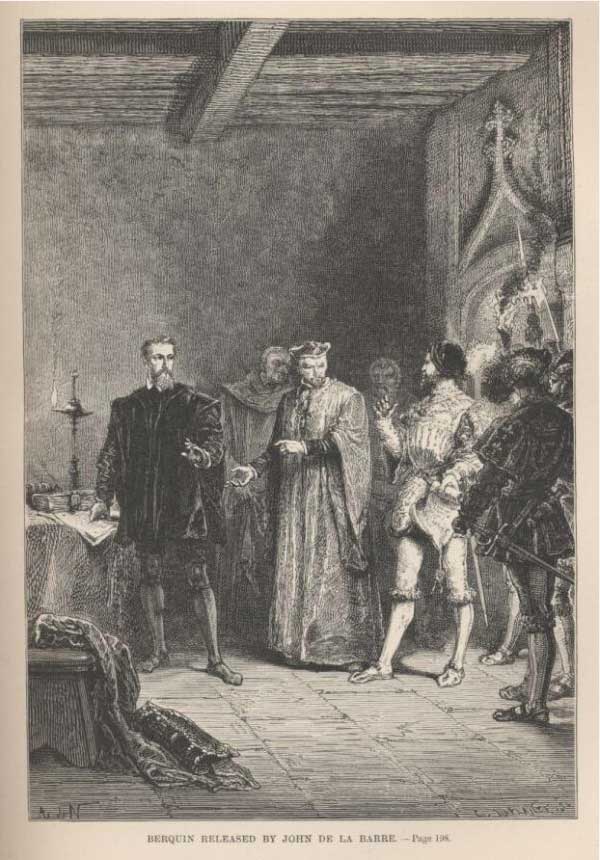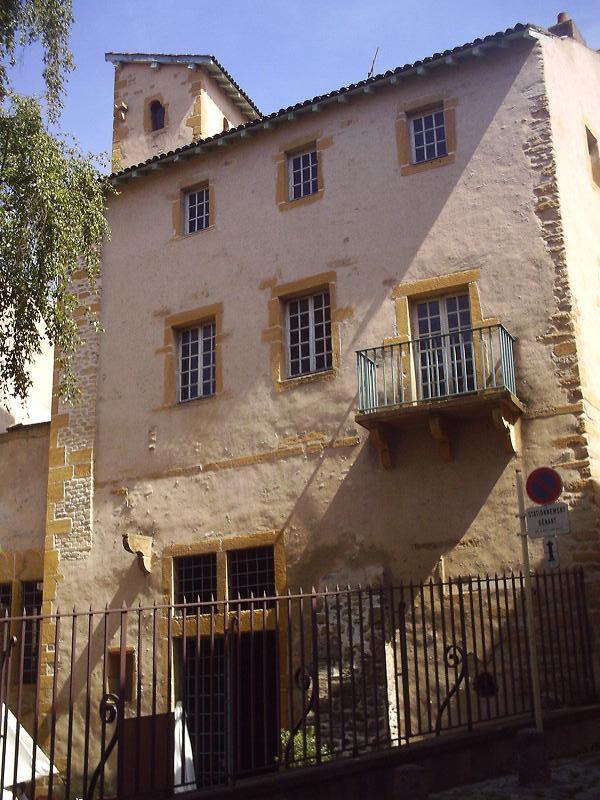|
Natalis Beda
Natalis Beda (French: Noël Beda; c. 1470 – 18 January 1537, Mont-Saint-Michel) was a French civil magistrate (syndic) and Catholic theologian best known for his staunch opposition to humanism and the Protestant Reformation, including the Meaux group. He was professor of theology, principal of the Collège de Montaigu from 1504 to 1513, and dean of the Sorbonne's Faculty of Theology. Charged by the Sorbonne with examining the doctrinal conformity of Erasmus' paraphrase of the Gospel of Luke, he identified some fifty condemnable propositions. Beda was satirized by François Rabelais in ''Gargantua and Pantagruel''. Works * ''Annotations'' (1526) * ''Adversus clandestinos Lutheranos'' (1529) See also * Erasmus * Petrus Sutor * Jan Standonck * Louis de Berquin * Gérard Roussel * Pierre Lizet Pierre Lizet (1482 – 17 June 1554) was a French magistrate. He received his education in civil law and canon law. From 1529 to 1549, he was the president of the Parlement of ... [...More Info...] [...Related Items...] OR: [Wikipedia] [Google] [Baidu] |
Mont-Saint-Michel
Mont-Saint-Michel (; Norman: ''Mont Saint Miché''; ) is a tidal island and mainland commune in Normandy, France. The island lies approximately off France's north-western coast, at the mouth of the Couesnon River near Avranches and is in area. The mainland part of the commune is in area so that the total surface of the commune is . , the island has a population of 29.Téléchargement du fichier d'ensemble des populations légales en 2019 INSEE The commune's position—on an island just a few hundred metres from land—made it accessible at low tide to the many ... [...More Info...] [...Related Items...] OR: [Wikipedia] [Google] [Baidu] |
Gargantua And Pantagruel
''The Five Books of the Lives and Deeds of Gargantua and Pantagruel'' (), often shortened to ''Gargantua and Pantagruel'' or the (''Five Books''), is a pentalogy of novels written in the 16th century by François Rabelais. It tells the adventures of two giants, Gargantua ( ; ) and his son Pantagruel ( ; ). The work is written in an amusing, extravagant, and satirical vein, features much erudition, vulgarity, and wordplay, and is regularly compared with the works of William Shakespeare and James Joyce. Rabelais was a polyglot, and the work introduced "a great number of new and difficult words ... into the French language". The work was stigmatised as obscene by the censors of the . In a social climate of increasing religious oppression in the lead up to the French Wars of Religion, contemporaries treated it with suspicion and avoided mentioning it.Le Cadet, Nicolas (2009). , Accessed 22 November 2010. It is the origin of the word " pantagruelism," meaning "burlesque co ... [...More Info...] [...Related Items...] OR: [Wikipedia] [Google] [Baidu] |
French Theologians
French may refer to: * Something of, from, or related to France ** French language, which originated in France ** French people, a nation and ethnic group ** French cuisine, cooking traditions and practices Arts and media * The French (band), a British rock band * "French" (episode), a live-action episode of ''The Super Mario Bros. Super Show!'' * ''Française'' (film), a 2008 film * French Stewart (born 1964), American actor Other uses * French (surname), a surname (including a list of people with the name) * French (tunic), a type of military jacket or tunic * French's, an American brand of mustard condiment * French (catheter scale), a unit of measurement * French Defence, a chess opening * French kiss, a type of kiss See also * France (other) * Franch, a surname * French Revolution (other) * French River (other), several rivers and other places * Frenching (other) * Justice French (other) Justice French may refer to: * C. G. ... [...More Info...] [...Related Items...] OR: [Wikipedia] [Google] [Baidu] |
1470 Births
Year 1470 ( MCDLXX) was a common year starting on Monday of the Julian calendar. Events January–December * March 12 – Wars of the Roses in England – Battle of Losecoat Field: The House of York defeats the House of Lancaster. * March 20 – The Battle of Nibley Green is the last fought between the private armies of feudal magnates in England. * Spring: Anglo-Hanseatic War: Hanseatic League privateers set sail. * May 15 – Charles VIII of Sweden, who has served three terms as King of Sweden, dies. Sten Sture the Elder proclaims himself Regent of Sweden the following day. * June 1 – Sten Sture is recognised as Swedish ruler by the estates. * July 12 – The Ottomans capture Euboea. * August 20 – Battle of Lipnic: Stephen the Great defeats the Volga Tatars of the Golden Horde, led by Ahmed Khan. * September 13 – A rebellion orchestrated by King Edward IV of England's former ally, Richard Neville, 16th Earl ... [...More Info...] [...Related Items...] OR: [Wikipedia] [Google] [Baidu] |
Pierre Lizet
Pierre Lizet (1482 – 17 June 1554) was a French magistrate. He received his education in civil law and canon law. From 1529 to 1549, he was the president of the Parlement of Paris. During the spread of Protestantism in France, the French Parliament started to evaluate appeals against sentences written by the Roman Catholic diocesan courts. In selected cases, bishops were censored by the civil legislative assembly when their decisions were declared to be heretical. In 1525, Guillaume Poyet, future lawyer of the king of France, asked the Parliament to suspend bishop of Angers Francis de Rohan (1480–1536) from its functions. It was the first case discussed in France. The bishop was guilty of simony because he had allowed his priests to be paid by Christian believers in order to administer sacraments to them. Lizet compared simoniac bishops to the heretics and asked the royal court to replace the ecclesiastical jurisdiction upon similar cases. Jean Guibert was the first French ... [...More Info...] [...Related Items...] OR: [Wikipedia] [Google] [Baidu] |
Gérard Roussel
Gérard Roussel (1500–1550) was a French cleric, a student of Jacques Lefèvre d'Étaples and later a member, with his former teacher, of the Circle of Meaux around Guillaume Briçonnet, bishop of Meaux. This group was characterized by evangelical sensibilities, but all the while remaining Catholics, at a time when religious identities were unclear and a matter of dispute, due to the very recent Protestant Reformation. Gérard Roussel, along with Jacques Lefèvre d'Étaples, was described by the historian Thierry Wanegffelen as being "between two pulpits", that of Rome and that of Geneva where Jean Calvin would settle permanently in 1541, and, more generally, between Catholicism and Protestantism.A. A. Tilley The Reformation In France./ref> When the Circle of Meaux was broken up in 1525, Roussel, like most of its members and unlike Guillaume Farel, stayed within the Catholic Church. He then became the personal preacher of Marguerite of Navarre, queen consort of Navarre ; unde ... [...More Info...] [...Related Items...] OR: [Wikipedia] [Google] [Baidu] |
Louis De Berquin
Louis de Berquin (c. 1490 – 17 April 1529) was a French lawyer, civil servant, linguist, lapidary, and Protestant reformer in the 16th century. He was burned at the stake as a heretic in April 1529 for refusing to recant his beliefs. Life and work Berquin was born of noble family around 1490 in Vieux-Berquin. Coming into contact with Christian humanists such as Erasmus and Jacques Lefèvre d'Étaples he began to study the Bible for himself and to advocate reform of the French Catholic Church from within. He desired to free France from the power of the pope. His writings aroused fierce opposition among traditional scholars. However, King Francis I and his sister Marguerite of Valois intervened in his behalf. Marguerite especially defended him, writing to the constable, Anne de Montmorency after Berquin was released from one arrest, "I thank you for the pleasure you have afforded me in the matter of poor Berquin whom I esteem as much as if he were myself; and so you may ... [...More Info...] [...Related Items...] OR: [Wikipedia] [Google] [Baidu] |
Jan Standonck
Jan Standonck (or ''Jean Standonk''; 16 August 1453 – 5 February 1504) was a Flemish priest, Scholastic, and reformer. He was part of the great movement for reform in the 15th-century French church. His approach was to reform the recruitment and education of the clergy, along very ascetic lines, heavily influenced by the hermit saint Francis of Paola. To this end he founded many colleges, all of them strictly controlled and dedicated to poor students with real vocations. Chief amongst them was the Collège de Montaigu, latterly part of the University of Paris. He lived at a time when this model of reform was under increasing pressure from more thoroughgoing critiques—including that of one of his most famous students, Erasmus. Early years He was born in Mechelen (at that time part of the Burgundian Netherlands) into extremely humble circumstances, the son of a poor cobbler. He received his early education there but quickly transferred to Gouda, where the Brothers of the ... [...More Info...] [...Related Items...] OR: [Wikipedia] [Google] [Baidu] |
Petrus Sutor
Petrus Sutor (French: Pierre Cousturier; c. 1480 – 18 June 1537) was a French theologian and Carthusian monk. Born in Chemere-le-Roy in the latter part of the 15th century, he earned a doctorate of theology at the Sorbonne in 1510 and then taught at the College of St. Barbe from about 1495 to about 1502. He later became a monk, entering the Carthusian order. Between 1514 and 1531, he was the prior of four Carthusian houses: Val-Dieu, Vauvert, Preize, and Notre-Dame-du-Parc. He was a follower of theologian Natalis Beda. In 1519, he was made governor of the Carthusians of Paris. Sutor is known for being an outspoken critic of Erasmus, Martin Luther, and Protestantism more generally. For example, in his 1525 work ''De Translatione Bibliae'' ("On the Translation of the Bible"), he vehemently opposed the translation of the Bible into vernacular languages while upholding the sufficiency of St. Jerome's Latin Vulgate. He "considered it sufficient that the people could recite ... [...More Info...] [...Related Items...] OR: [Wikipedia] [Google] [Baidu] |
Baker Academic
Baker Publishing Group is a Christian book publisher that discusses historic Christian happenings for its evangelical readers. It is based in Ada, Michigan and has six subdivisions: Bethany House, Revell, Baker Books, Baker Academic, Chosen, and Brazos Press. History The company was founded in 1939 by Herman Baker in Grand Rapids, Michigan. The company mainly publishes content that covers many issues ranging from family life to theology, mostly within a broad evangelical framework. Baker acquired the Revell Company in 1992. Furthermore, Baker also publishes books and ministry resources for pastors and church leaders, concentrating on topics such as preaching, worship, pastoral ministries, counseling and leadership. Apart from that, they also publish content for lay Christians on topics such as discipleship, spirituality, encouragement, relationships, marriage, parenting and the intersection of Christianity and culture. In June 2014, Baker Publishing Group announced that it ... [...More Info...] [...Related Items...] OR: [Wikipedia] [Google] [Baidu] |
François Rabelais
François Rabelais ( , ; ; born between 1483 and 1494; died 1553) was a French writer who has been called the first great French prose author. A Renaissance humanism, humanist of the French Renaissance and Greek scholars in the Renaissance, Greek scholar, he attracted opposition from both Protestant theologian John Calvin and from the hierarchy of the Catholic Church. Though in his day he was best known as a physician, scholar, diplomat, and Catholic priest, later he became better known as a satirist for his depictions of the grotesque, and for his larger-than-life characters. Living in the religious and political turmoil of the Reformation, Rabelais treated the great questions of his time in his novels. Rabelais admired Erasmus and like him is considered a Christian humanism, Christian humanist. He was critical of medieval scholasticism and lampooned the abuses of powerful princes and popes. Rabelais is widely known for the first two volumes relating the childhoods of the gia ... [...More Info...] [...Related Items...] OR: [Wikipedia] [Google] [Baidu] |
Syndic
''Syndic'' (; Greek: ) is a term applied in certain countries to an officer of government with varying powers, and secondly to a representative or delegate of a university, institution or other corporation, entrusted with special functions or powers. The meaning which underlies both applications is that of representative or delegate. Du Cange, after defining the word as , , , proceeds: "" ('Syndics: chiefly, the term for the members acting for universities, colleges, societies, and other bodies, through whom, as in a republic, what must be pursued or decreed in common, is pursued and decreed'), and gives several examples from the 13th century of the use of the term. The most familiar use of ''syndic'' in the first sense is that of the Italian and the French who is the head of the administration of a , comparable to a mayor, and a government official, elected by the residents of the commune. Use in public administration and ombudsman bodies Use in Italian and French lingu ... [...More Info...] [...Related Items...] OR: [Wikipedia] [Google] [Baidu] |


